Dental Implant Healing Stages: A Complete Guide
The dental implant healing stages are a critical part of the success of dental implant procedures. From the initial recovery to osseointegration, each phase ensures that the implant integrates well with the jawbone and provides a stable foundation for your new teeth. Understanding these stages helps patients prepare for what to expect and follow proper care guidelines to promote optimal healing.
What Are Dental Implants?
A dental implant is a surgical component that acts as a replacement for the root of a missing tooth. It is usually made from titanium and is surgically inserted into the jawbone. Over time, the implant fuses with the bone through a process called osseointegration, providing a stable foundation for an artificial tooth (crown), bridge, or denture.
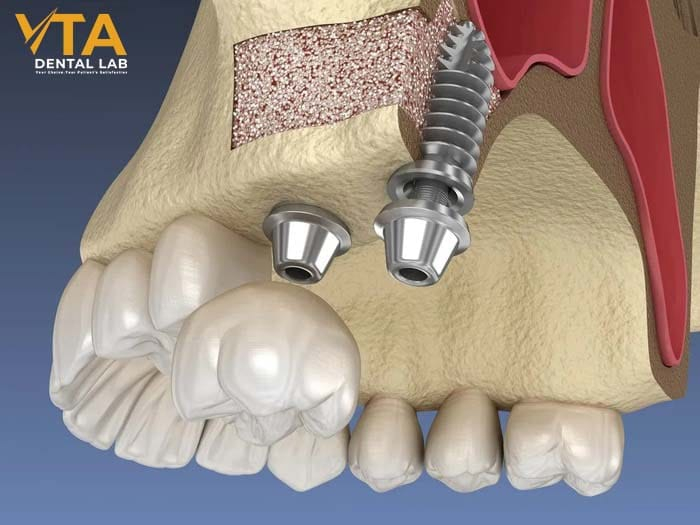
Here is the procedure for dental implants:
- Initial Consultation: Evaluation of dental health, X-rays, and treatment planning.
- Tooth Extraction (if needed): Remove the damaged tooth if it is not already missing.
- Bone Grafting (if needed): Bone grafting may be done if the jawbone is too thin or soft to support the implant.
- Implant Placement: The dental implant (a titanium post) is surgically inserted into the jawbone.
- Healing Period: Osseointegration occurs as the implant fuses with the jawbone over several months.
- Abutment Placement: Once healed, an abutment is attached to the implant to hold the new tooth.
- Crown Placement: A custom-made crown (artificial tooth) is attached to the abutment for a natural look and function.
The dental implant healing stages after getting a dental implant
The healing process after getting a dental implant typically involves several stages. Here’s an overview of the key healing stages:
Initial Healing Stage (0-2 weeks)
During the initial healing phase, it is not uncommon to experience some factors such as facial swelling and bruising in the implant area, which is completely normal. Many patients can use cold compresses on the outside to help reduce swelling in the mouth area as advised by the doctor.
In the first 24 hours, patients can eat and drink hot foods. They should prioritize soft foods such as soup, noodles, and porridge and avoid tough foods. In the first 2 weeks, patients will feel the most changes and improvements.
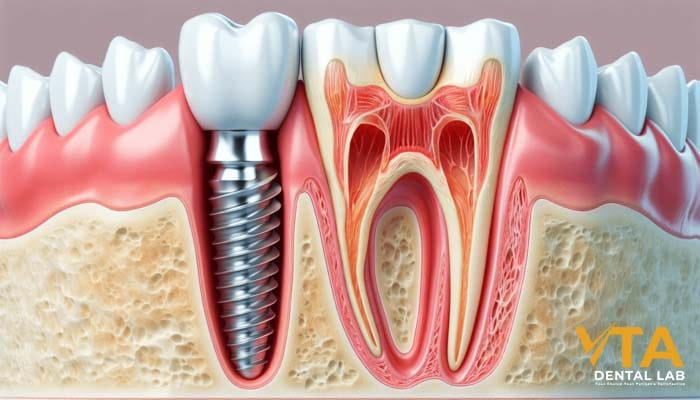
Osseointegration Phase (3-6 weeks)
Over a period of 3 to 6 months, the implant will heal and become more comfortable, allowing the patient to resume normal activities and eating. The dental surgeon will then ask to see the patient again for a check-up to ensure the implant is stabilizing.
Final Restoration Stage
Once the implant has fully integrated with the bone, the final stage of recovery involves meeting with your dentist to take impressions of your teeth to create the final restoration that will attach a crown, bridge, or denture to the implant.
The dental implant healing stages can take several months, depending on individual healing rates and whether bone grafting is needed. On the other hand, adhering to post-operative care instructions and attending follow-up appointments is crucial for optimal healing.
Dental Implant Recovery Time
Dental implant recovery time can vary depending on many factors, such as overall health, jawbone condition, and the specific procedure performed.
Single Tooth Implant
A single implant is placed into the jawbone, then a crown is attached to the implant. This new tooth will look and function just like your natural tooth, allowing you to eat, speak, and smile with confidence.
The single-tooth implant procedure is simpler and has a shorter healing time than a full-mouth implant. The overall recovery time is about 3-6 months
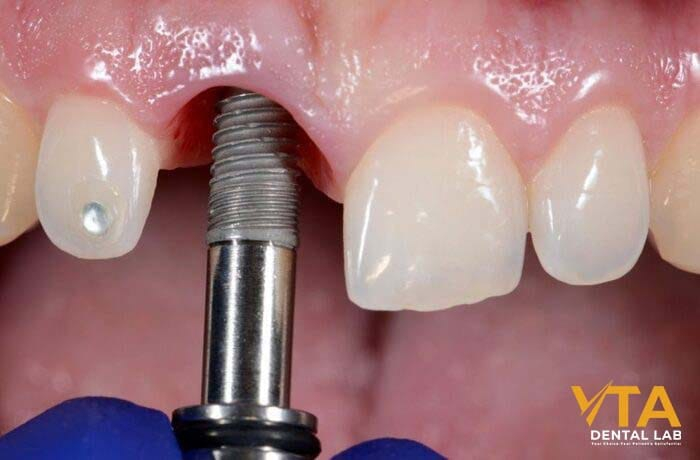
Full Mouth Implants
Full mouth implant surgery is a surgical procedure that replaces all the teeth in the upper jaw, lower jaw, or both. The number of dental implants needed will depend on the patient’s case.
The surgery involves placing implants in strategic locations in the mouth to support a full set of replacement teeth. The overall recovery time is approximately 4-6 months.
See more: All on x dental implants
Factors Affecting Recovery Time
- Overall Health: Conditions like diabetes can slow the healing process.
- Post-Operative Care: Adhering to the dentist’s instructions and maintaining proper oral hygiene can influence recovery speed.
- Jawbone Condition: If the jawbone is not thick or strong enough, bone grafting may be necessary, extending the recovery time.
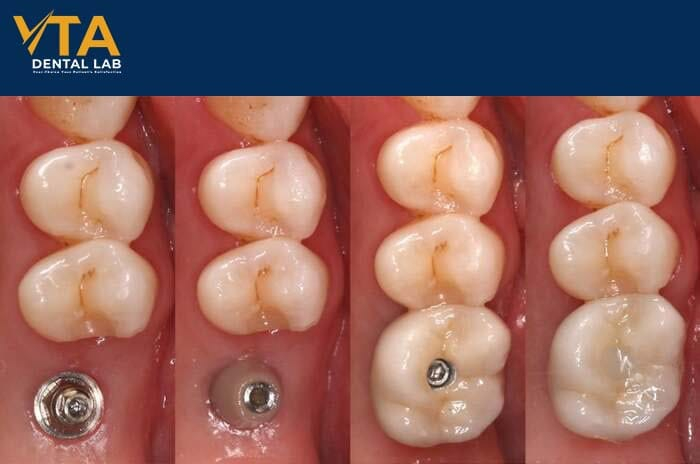
Who Cannot Have a Dental Implant?
Some contraindications may prevent you from getting a dental implant. However, some factors can be improved by the doctor to make the patient eligible for implant surgery. Here are some relative contraindications to implant surgery:
Uncontrolled Chronic Diseases: Conditions such as diabetes mellitus that are not well-managed can hinder healing and integration of the implant.
Smoking: Tobacco use can impair blood flow, leading to delayed healing and increased risk of implant failure.
Bone Quality and Quantity: Insufficient bone density or volume may require bone grafting, which can complicate the procedure and prolong recovery.
Periodontal Disease: Active gum disease needs to be treated before implant placement to ensure proper healing and integration.
Infection: Any ongoing infection in the oral cavity must be resolved before proceeding with implant surgery.
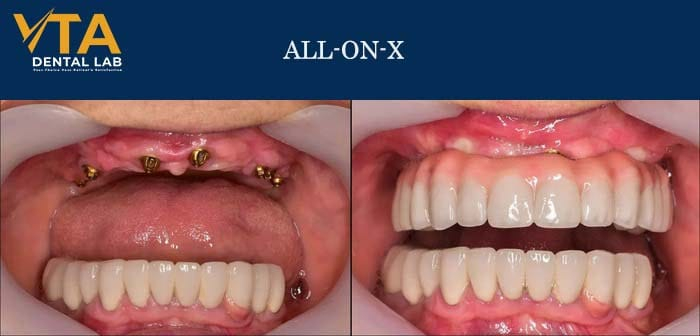
Care Tips During Dental Implant Healing Stages
Dental implant healing stage care plays an important role in ensuring a quick recovery. Here are some dental implant care tips that you can refer to during the healing process.
- Do not participate in any strenuous exercise or activity after the first few days of surgery
- Do not eat or drink hot foods in the first 24 hours
- Minimize damage to the implant site with your tongue or fingers
- Do not use alcohol
- Avoid rubbing the toothbrush on the implant area in the first few days
- Patients should limit the use of dentures during the healing process in the first week
Conclusion
If you are looking to replace one or more missing teeth that can last a long time, dental implants are the ideal choice for you. Dental implants provide full functionality during daily activities and ensure optimal aesthetics like natural teeth.
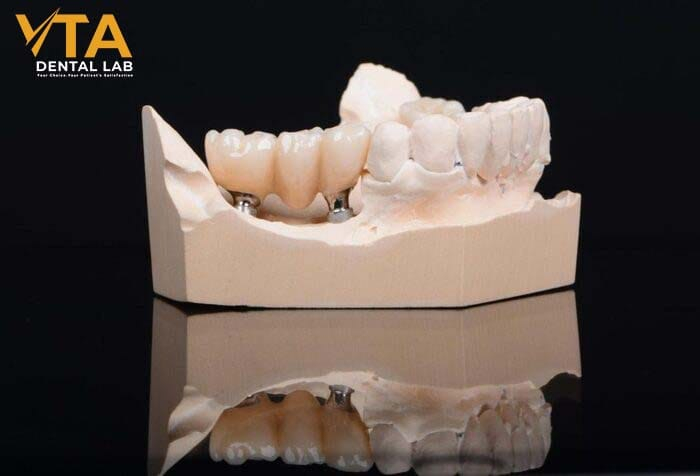
VTA Dental Lab in California is the address for manufacturing and supplying a variety of dental restoration products, especially dental implants. With more than 20 years, we are committed to providing high-quality restoration services, and custom dental restorations using advanced technology and skilled craftsmanship. Our products are designed to ensure both aesthetics and durability, providing your patients with the best possible care.
Partner with VTA Dental Lab today to elevate your dental practice. Contact us now via Email at info@vtadentallab.com or use our secure Online Appointment Request Form to get started with your consultation.